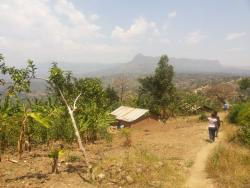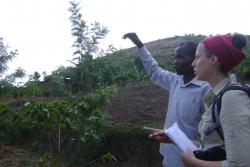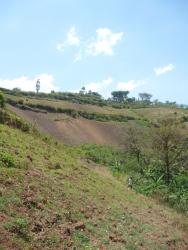Bangor University promotes agroforestry to combat land degradation in Uganda
Bangor University recently held a training course in Eastern Uganda, in collaboration with The World Agroforestry Centre (ICRAF) and the National  Landscape in Namabya Sub-county, Manafwa District of Eastern Uganda. Photograph taken by Anne Kuria, March 2014.Forestry Resources Research Institute (NaFORRI). MSc Forestry students (including SUTROFOR scholars and a distance learning Commonwealth Scholarship Commission scholar) from the School of Environment, Natural Resources and Geography attended the course alongside researchers from partner institutes in Uganda and Burundi. The aim of the training was to equip researchers with the skills they need to collect and analyse local knowledge of trees and understand drivers of tree cover/landuse change. The results from further research in the area will feed into an Australian Centre for International Agricultural Research (ACIAR) funded project called ‘Trees for Food Security’ (http://worldagroforestry.org/project/aciar). Two Bangor MSc Sustainable Tropical Forestry students (Mussie Tesfamicheal and Cecilia Kwateng Yeboah) are now conducting their fieldwork under the project and will present their results back to project partners in Nairobi at ICRAF Headquarters in June.
Landscape in Namabya Sub-county, Manafwa District of Eastern Uganda. Photograph taken by Anne Kuria, March 2014.Forestry Resources Research Institute (NaFORRI). MSc Forestry students (including SUTROFOR scholars and a distance learning Commonwealth Scholarship Commission scholar) from the School of Environment, Natural Resources and Geography attended the course alongside researchers from partner institutes in Uganda and Burundi. The aim of the training was to equip researchers with the skills they need to collect and analyse local knowledge of trees and understand drivers of tree cover/landuse change. The results from further research in the area will feed into an Australian Centre for International Agricultural Research (ACIAR) funded project called ‘Trees for Food Security’ (http://worldagroforestry.org/project/aciar). Two Bangor MSc Sustainable Tropical Forestry students (Mussie Tesfamicheal and Cecilia Kwateng Yeboah) are now conducting their fieldwork under the project and will present their results back to project partners in Nairobi at ICRAF Headquarters in June.
The truly international course took place over a two week period in the lead up to the United National International Day of Forests, involving practical exercises in the field and theoretical/methodological training in local knowledge acquisition of farmers in Namabya Sub-county, Manafwa District of Eastern Uganda, one of  Laura Kmoch, a Bangor MSc Sustainable Tropical Forestry student, interviewing a farmer on his land in Namabya Sub-county, Manafwa District of Eastern Uganda. Photograph taken by Kenneth Eryau, February 2014.the research sites for the project. Participants learnt how to use the Agro-ecological Knowledge Toolkit (AKT5) software to create individual knowledge bases using the interviews they carried out in the field. Participatory rural appraisal (PRA) tools were used to complement semi-structured interviews and focus group discussions, including Venn diagramming, resource mapping, farm sketches, and seasonal calendars. Class based activities included landscape characterisation, processing interviews and representing knowledge using the AKT5 software. The main topics covered during interviews were: seasonal fodder availability, tree management, spatial arrangement of trees on farms, and ecosystem service provisioning of the different tree species found in the area. Drivers of tree cover change, soil types, and tree-crop-livestock interactions were also explored.
Laura Kmoch, a Bangor MSc Sustainable Tropical Forestry student, interviewing a farmer on his land in Namabya Sub-county, Manafwa District of Eastern Uganda. Photograph taken by Kenneth Eryau, February 2014.the research sites for the project. Participants learnt how to use the Agro-ecological Knowledge Toolkit (AKT5) software to create individual knowledge bases using the interviews they carried out in the field. Participatory rural appraisal (PRA) tools were used to complement semi-structured interviews and focus group discussions, including Venn diagramming, resource mapping, farm sketches, and seasonal calendars. Class based activities included landscape characterisation, processing interviews and representing knowledge using the AKT5 software. The main topics covered during interviews were: seasonal fodder availability, tree management, spatial arrangement of trees on farms, and ecosystem service provisioning of the different tree species found in the area. Drivers of tree cover change, soil types, and tree-crop-livestock interactions were also explored.
The research site showed high potential for agroforestry interventions to both combat land degradation and improve farmer livelihoods. The Size of Wales project is also working in the region (http://sizeofwales.org.uk/projects/one_million_trees.html) to restore soils through tree planting, with a particular focus on shade trees within coffee systems. Their local partner, Mbale CAP (http://www.mbaletrees.org) is collaborating with the ACIAR Trees for Food Security project to ensure resources are put to the best use and  Farming on steep slopes in Namabya Sub-county, Manafwa District of Eastern Uganda. Photograph taken by Genevieve Lamond, February 2014.research findings will inform any development activities on the ground. Initial findings suggest there is a lack of knowledge on propagation of native tree species and an over-emphasis on fast growing exotic species without the necessary knowledge of proper management and spacing. By identifying such knowledge gaps, interventions can be designed that address both environmental and livelihood needs.
Farming on steep slopes in Namabya Sub-county, Manafwa District of Eastern Uganda. Photograph taken by Genevieve Lamond, February 2014.research findings will inform any development activities on the ground. Initial findings suggest there is a lack of knowledge on propagation of native tree species and an over-emphasis on fast growing exotic species without the necessary knowledge of proper management and spacing. By identifying such knowledge gaps, interventions can be designed that address both environmental and livelihood needs.
Publication date: 25 March 2014
